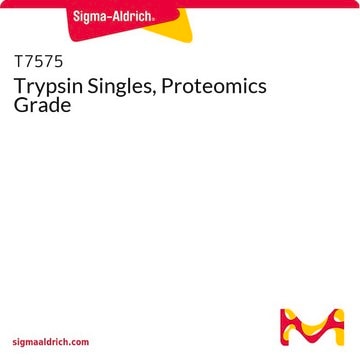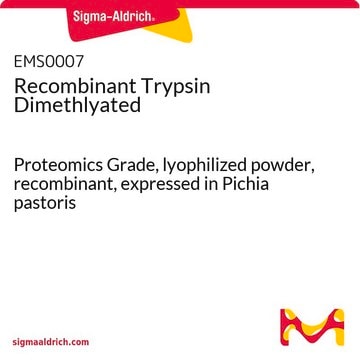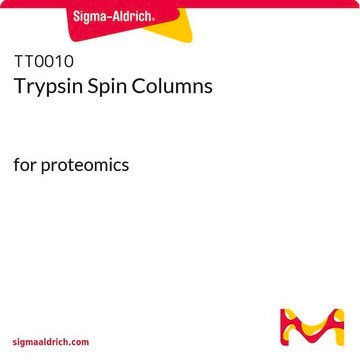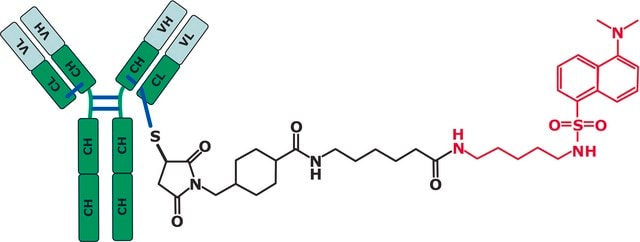EMS0004
SOLu-Trypsin
recombinant, expressed in Pichia pastoris, Proteomics Grade, liquid
Sinonimo/i:
Protein Digestion for Mass Spectrometry, Ready to Use Recombinant Trypsin for Protein Digestion in Mass Spectrometry, Recombinant Trypsin for Protein Digestion in Mass Spectrometry, Trypsin for Protein Digestion, rTrypsin
Scegli un formato
Scegli un formato
About This Item
Prodotti consigliati
Categorie correlate
Descrizione generale
Applicazioni
Azioni biochim/fisiol
- SOLu-Trypsin (EMS0004) is our exclusive, Advanced Proteomics Grade enzyme that is solution-stable for mass spectrometry.
- Designed to be stable in solution when refrigerated, SOLu-Trypsin can be used immediately without preparation.
- Other forms of trypsin require thawing or reconstitution, and must be discarded if not used immediately.
- SOLu-Trypsin allows excess product to be saved for future use, thus eliminating unnecessary waste and cost.
- It is formulated with a high-purity recombinant trypsin, free of chymotryptic activity, to ensure high fidelity digestion.
Caratteristiche e vantaggi
- Ready to use - no preparation, such as reconstitution or thawing, is required
- Fits seamlessly into established workflow - no need to modify protocols
- Eliminates waste - remains stable in the refrigerator after use so there is no need to discard excess product
- Recombinant, porcine sequence - no chymotryptic activity
- Stable for short-term use at room temperature in an autosampler or on a liquid handling robot
Codice della classe di stoccaggio
10 - Combustible liquids
Classe di pericolosità dell'acqua (WGK)
WGK 1
Punto d’infiammabilità (°F)
Not applicable
Punto d’infiammabilità (°C)
Not applicable
Scegli una delle versioni più recenti:
Certificati d'analisi (COA)
Non trovi la versione di tuo interesse?
Se hai bisogno di una versione specifica, puoi cercare il certificato tramite il numero di lotto.
Possiedi già questo prodotto?
I documenti relativi ai prodotti acquistati recentemente sono disponibili nell’Archivio dei documenti.
I clienti hanno visto anche
Articoli
Evaluation of Recombinant, Chemically Treated Trypsin in Proteomics and Protein Characterization Assays
Pretreatment with Mucinase StcE increases glycopeptide identification from mucin samples, enhancing sample preparation efficiency for glycopeptide analysis.
An optimized peptide mapping protocol using NISTmAb as a model monoclonal antibody, shorter incubation times, and improved digestion buffer to demonstrate minimal artificial asparagine deamidation and methionine oxidation.
Rapid trypsin digest kit yields reliable results in less than 2 hours for mass spectrometry analysis.
Protocolli
An optimized LC-MS/MS based workflow for low artifact tryptic digestion and peptide mapping of monoclonal antibody, adalimumab (Humira) using filter assisted sample preparation (FASP).
Contenuto correlato
Find protein research tools to prepare, isolate, and analyze proteins. Organized by how to extract, protect, purify, enrich, modify, and quantify proteins.
Filtri attivi
Il team dei nostri ricercatori vanta grande esperienza in tutte le aree della ricerca quali Life Science, scienza dei materiali, sintesi chimica, cromatografia, discipline analitiche, ecc..
Contatta l'Assistenza Tecnica.